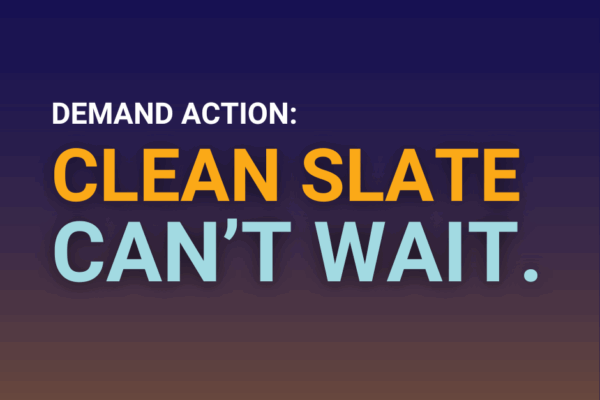This article was originally published in Delaware Online.
On August 1, 2024, Delaware’s Clean Slate law went into effect, promising access to a true second chance for more than 290,000 Delawareans eligible for automated expungement of their criminal records. Clean Slate brought hope of finally living free from endless barriers to education, employment, housing, and more. It’s been over four months since implementation and more than three years since Clean Slate’s initial passage. What should have been a transformative step for Delaware’s criminal legal system has fallen disappointingly short of expectations.
As of October 31, 2024, only 624 records have been cleared — less than 1% of those eligible for automated expungement — and little progress has been made to create an accessible pathway for Delawareans to learn if their record has been cleared.
The State’s inaction is more than just another example of sluggish bureaucracy — it’s a moral failure. Clean Slate’s poorly executed rollout could have life-altering consequences for hundreds of thousands of Delawareans: rejected college applications, missed job opportunities, and housing denial, can impact families for years to come. For our community’s most vulnerable, the consequences could be even more catastrophic. President-elect Trump has pledged to enact policies that target immigrants immediately upon taking office in January. Many people are still required to provide documentation of their record clearance when seeking to renew or change their immigration status. Because the current system fails to provide individuals access to their cleared records hundreds of Delawareans could be at risk of losing their legal status and facing deportation.
Delaware has positioned itself as a champion of Clean Slate policies but has not delivered on its promise. As we look ahead to the inauguration of a new Governor, Lieutenant Governor, and state legislature in 2025, new leadership must deliver on the promises of Clean Slate and implement an automated, transparent program that quickly and accurately clears Delawareans’ criminal records without delay.
For Governor-elect Matt Meyer and Lt. Governor-elect Kyle Evans Gay, the first 90 days in office present a critical opportunity to fulfill their campaign promises to address these Clean Slate delays, ensure the timely sealing of remaining eligible records, and reaffirm Delaware’s position as a national leader on second chances. The Governor and Lt. Governor-elect should seek to be just as efficient as states like Pennsylvania and Michigan.
Since 2019, Pennsylvania's Clean Slate law has seen 45,178,422 records cleared, benefitting 1.2 million Pennsylvanians. That impact continues to grow as state leaders expanded the original legislation to remove the requirement to satisfy court fines and fees, include certain felony convictions, and shorten waiting periods for clearing misdemeanor and summary convictions. In Michigan, within just one year of Clean Slate taking effect, 1.4 million old convictions were cleared, and over 280,000 people have completely clean records. Michigan responded to initial backlogs by using the power of automated computer algorithms to scan the Michigan State Police criminal history database daily and identify eligible records. This automated approach streamlines the record clearing process and saves taxpayer dollars by increasing government efficiency.
Pennsylvania and Michigan’s success required strong executive leadership that guided collaboration between state agencies, prioritized the expansion of existing policies, and invested in the development of technology to address obstacles. To ensure similar success in Delaware, Governor-elect Meyer and Lt. Governor-elect Gay must take these concrete steps within their first 90 days in office:
- Use the resources and support available to Clean Slate states to remove unnecessary manual processes currently delaying the clearance of hundreds of thousands of eligible records and automate Clean Slate record clearance; and
- Create a pathway for people to learn if their record has been cleared and access their own expunged records for immigration, federal employment, military enlistment, and other purposes.
Passage of the initial Clean Slate legislation was only the first step to delivering a second chance to Delawareans. As our executive leadership works to move Delaware’s existing Clean Slate law forward, our state legislators must continue the work to expand Clean Slate policies — beginning with removing fines and fees as a barrier to record expungement.
Delaware not only has the highest per capita misdemeanor arrest rate in the country, resulting in an excess of fines and fees that many people are left unable to pay, but also limits eligibility for record clearance due to outstanding fines and fees. Fines and fees related to a person’s record often go unpaid because people cannot access stable employment, housing, and opportunities for advancement due to their record. This year, state legislators must expand Delaware’s Clean Slate law to allow individuals to clear their records regardless of the fines and fees they owe – a common-sense solution to increase financial stability for Delawareans and help ensure people have the resources to pay their fines and fees.
Clean Slate can’t wait. Delaware’s reputation as the “First State” should motivate us to set a forward-thinking example. Ensuring Delaware’s Clean Slate law is fully implemented, and that our state continues to be a leader for second chances is a win for all of us: it is life-changing for individuals, benefits families for generations to come, and has transformative power for our entire state.
Sign the petition to demand Delaware state leaders act to support Clean Slate’s implementation now at action.aclu.org/clean-slate-cant-wait.
To learn more, visit CleanSlateDE.org.

